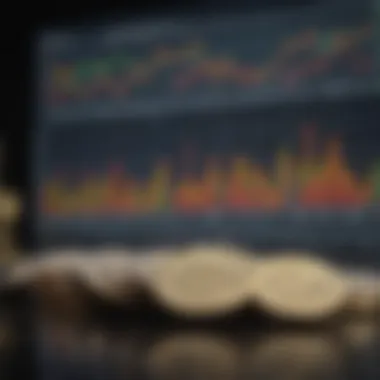Smart Strategies for Converting US Dollars to Euros


Intro
Converting US dollars to euros requires careful consideration of several factors. It is important to choose a method that minimizes costs and maximizes convenience. With the rising number of options available, knowing how to effectively manage the conversion process is crucial. This guide aims to equip readers with the necessary tools to navigate currency exchange, whether for travel, online purchases, or investment purposes.
Understanding Currency Conversion Methods
Currency conversion is the process of exchanging one currency for another. The methods available can vary significantly in terms of exchange rates and fees. In this section, we will explore the most common methods of converting US dollars to euros while highlighting their advantages and disadvantages.
Banks and Financial Institutions
Most banks offer currency exchange services. These institutions typically provide competitive rates, especially for clients with existing accounts. However, banks may impose higher fees than other providers.
Currency Exchange Bureaus
Currency exchange bureaus are commonly found at airports and tourist areas. They provide quick service, but rates can be less favorable than those offered by banks. Fees may vary widely, and customers should inquire about any hidden charges.
Online Money Transfer Services
Services like PayPal, TransferWise, and Revolut allow users to convert currencies through their platforms. These services often provide more competitive rates and lower fees compared to banks. However, processing times can vary, so planning ahead is advisable.
ATMs Abroad
Withdrawing euros directly from ATMs can be an efficient way to obtain the local currency. Users should check with their banks about potential fees for international withdrawals, as well as the exchange rates applied.
Peer-to-Peer Exchange Platforms
Some platforms facilitate direct currency exchanges between users. This method can provide advantageous rates, but it carries greater risks, including scams and lack of consumer protection.
Factors Influencing Currency Exchange Rates
Understanding the factors that influence currency exchange rates is essential for making informed decisions. Exchange rates fluctuate due to various economic and political conditions:
- Interest Rates: When a country's interest rates rise, its currency often strengthens versus others.
- Economic Indicators: Reports on economic health can affect investor confidence and consequently the value of a currency.
- Political Stability: Countries with less risk of political turmoil often have stronger currencies.
- Market Sentiment: Traders’ perceptions and speculations can lead to short-term fluctuations.
Closure
Overview of Currency Conversion
Understanding the dynamics of currency conversion is crucial for anyone seeking to exchange US dollars for euros. The process is not only about simple arithmetic; it involves various considerations that can significantly impact the amount received after conversion. Various methods exist for converting currencies, each with unique advantages and disadvantages. Therefore, a deep analysis into these methods can aid in making informed decisions. This article is structured to illuminate those complexities and guide you through effective strategies for conversion.
Understanding Currency Exchange
Currency exchange refers to the process of converting one currency into another at the established market rate. In this context, knowing the nuances of how currencies fluctuate is vital. Exchange rates are influenced by multiple factors, such as economic performance, political stability, and market sentiment. For instance, a strong economy generally supports a stronger currency, while political turmoil can lead to depreciation. It's not just about converting dollars to euros; it involves understanding what affects these values and how you can take advantage of favorable rates.
Gathering information on the current exchange rate can provide a strategic edge. For example, if a user notices a significant drop in the USD to EUR exchange rate, they might opt to convert funds immediately rather than waiting. This can maximize the amount received in euros.
Importance of Knowing Exchange Rates
Exchange rates are more than just numbers; they directly affect how much currency you receive in conversion. Monitoring them is essential for anyone dealing with cross-border transactions or planning travel. An advantageous exchange rate can mean the difference between receiving a sizeable amount in euros or a disappointing sum.
For those who travel or conduct business regularly, understanding exchange rates can result in better financial management. It allows individuals to time conversions effectively. In today’s digital age, various tools, apps, and websites make monitoring exchange rates simpler, offering real-time data and alerts. Staying informed also helps assess various conversion methods and ensures one is choosing the option that minimizes costs.
“A small change in the exchange rate can lead to significant differences in the amount ultimately received.”
In summary, grasping the basics of currency exchange and the importance of tracking exchange rates is fundamental in optimizing currency conversion. The more informed an individual is about these elements, the more empowered they become in their financial dealings abroad.


Methods for Currency Conversion
Currency conversion is a vital process for anyone looking to exchange US dollars for euros. Understanding the various methods available can greatly influence the effectiveness and efficiency of your transactions. Each method offers distinct advantages and considerations. The right option can save you money, provide better convenience, and ensure that you are informed about the best practices when converting currencies. Below, we will examine the primary methods used for currency conversion, detailing how they work and what to expect.
Banks and Financial Institutions
Banks are one of the most common avenues for currency conversion. Generally, banks provide a reliable and safe environment for exchanging money, offering competitive rates in many cases. Using a bank for currency conversion can be particularly advantageous if you already maintain an account, as they may waive certain fees for customers. However, be aware that banks sometimes have higher fees compared to other methods.
- Exchange rates can vary significantly between banks, so it is wise to compare different institutions before proceeding.
- Processing time can be slower than other options, particularly for international transfers.
In essence, banks offer stability, but it is crucial to scrutinize fees and rates thoroughly before finalizing a transaction.
Currency Exchange Bureaus
Currency exchange bureaus are found in many airports, shopping centers, and tourist areas. They often provide a quick and convenient way to exchange dollars for euros. These bureaus typically do not require any banking relationship, making them accessible for casual travelers.
- One benefit of using a currency exchange bureau is the speed of service – transactions are completed swiftly.
- However, the exchange rates at these bureaus may not be the best available, and their fees can be steep. Therefore, it is essential to review and understand their rates before exchanging your money.
Ultimately, while convenient, currency exchange bureaus may not always offer the best overall value for your currency conversion needs.
ATMs and Withdrawal Options
ATMs provide another straightforward way to convert US dollars to euros. Many international ATMs allow cardholders to withdraw euros directly from their accounts, converting the currency automatically. It’s important to ensure your bank card is suitable for international use, as some cards may have restrictions.
- Fees for using an ATM abroad can vary, with some banks offering more favorable rates than currency exchanges.
- The exchange rate offered at ATMs usually aligns more closely with market rates, which is a significant advantage.
Using ATMs is often efficient and may yield better rates, but remember to factor in any withdrawal fees your bank might impose.
Online Currency Exchange Platforms
With the rise of technology, online currency exchange platforms have grown in popularity. These services allow users to convert currencies with just a few clicks. Many platforms emphasize user experience and competitive rates, often bypassing traditional banking structures.
- Online platforms usually offer transparent fee structures and users can compare rates easily among different services.
- However, it is essential to verify the security of the platform before conducting any transactions, ensuring they are reputable.
Online currency exchange platforms can be a great option for individuals comfortable navigating digital services while also looking for favorable exchange rates.
Peer-to-Peer Currency Exchange
Peer-to-peer (P2P) currency exchange platforms facilitate direct transactions between individuals. Users can exchange currency with one another without the need for an intermediary. This method can sometimes provide better rates depending on the agreements made between users.
- The flexibility of P2P exchanges can lead to great savings, particularly in high-volume exchanges.
- Nonetheless, this method can introduce uncertainties, as it relies on trust between parties and may involve risks if proper verification is not ensured.
In summary, peer-to-peer currency exchange represents a modern approach to converting currencies that may yield benefits, yet it requires caution and due diligence.
Analyzing Exchange Rates
Understanding exchange rates is critical when converting US dollars to euros. Exchange rates dictate how much one currency is worth in terms of another. In this context, they profoundly affect the amount of euros you can acquire per dollar. Fluctuations can happen rapidly; thus, being informed can lead to significant financial benefits.
Factors Influencing Exchange Rates
Several factors can influence exchange rates, often in complex ways. Key elements include:
- Interest rates: Higher interest rates offer lenders a higher return relative to other countries. Consequently, this attracts foreign capital and causes the exchange rate to rise.
- Inflation rates: A country with a lower inflation rate than other countries will see an appreciation in currency value. Low inflation strengthens purchasing power and can enhance currency value.
- Political stability: Countries that are considered stable and have low risk politically often attract foreign investment. This demand for investments increases the value of that country’s currency.
Understanding these factors enables individuals to better anticipate market movements. For those converting dollars to euros, knowing how these elements play out can prove beneficial in timing exchanges effectively.


How to Monitor Exchange Rates
Monitoring exchange rates is necessary for making informed conversion decisions. Here are some effective methods:
- Currency converter apps: Various applications are available that provide real-time exchange rates. Using these can help you track rates on the go.
- Financial news websites: Websites like Bloomberg or Reuters regularly publish updates on currency values. Following such sites enhances your understanding of market movements.
- Bank platforms: Many banks provide tools for monitoring exchange rates directly through their online services.
Regularly checking these sources can help you spot when the exchange rate is favorable for conversion. Staying updated will allow a sharp decision to be made.
Historical Trends in USD to EUR Exchange Rates
Historically, the exchange rate between the US dollar and the euro has exhibited notable volatility. Analyzing these trends can offer vital insight. Factors affecting these trends include:
- Economic events like recessions or booms.
- Key announcements from central banks such as the Federal Reserve or the European Central Bank.
- Global economic factors, including trade agreements or conflicts that can disrupt the market.
Studying historical patterns can provide context for understanding present rates. You might find graphs and data analysis on websites like Wikipedia or Britannica beneficial. Such insights help individuals to interpret broader economic signals, enabling more effective currency conversion strategies.
Understanding the intricacies of exchange rates is essential for effective currency conversion, not just for immediate transactions but for strategic financial planning moving forward.
Calculating Conversion Costs
Calculating conversion costs is essential for anyone tackling currency exchange, particularly when converting US dollars to euros. Understanding these costs helps individuals assess the true value of their conversion and avoid unexpected losses.
The benefits of knowing conversion costs extend beyond simple currency exchange. Awareness of fees, charges, and fluctuations can lead to more favorable exchange outcomes. It empowers individuals to make informed decisions that align closely with their financial goals, whether for travel, business, or investments.
Identifying Fees and Charges
When converting US dollars to euros, identifying fees and charges is imperative. Different methods of currency conversion come with varying fee structures.
- Bank Fees: Banks typically charge service fees for currency conversions. These fees can be flat amounts or a percentage of the transaction. Understanding this can help you select a bank with the most favorable terms.
- Currency Exchange Bureaus: These establishments may also impose fees. In many cases, they offer competitive rates, but it is vital to clarify if there are additional charges.
- Online Platforms: Some online currency exchange platforms may have lower fees than traditional brick-and-mortar establishments. However, users should still be wary of hidden fees that may appear during the transaction process.
- ATMs: Withdrawing euros from an ATM can result in both bank fees and conversion fees. It's good to check with the bank beforehand for their charge schedule.
By carefully scrutinizing these costs upfront, one can avoid surprises down the line when the actual exchange is executed.
Understanding Variability in Conversion Costs
Exchange rates are not static; they fluctuate constantly due to market conditions. Thus, understanding this variability is crucial for optimizing currency conversion.
- Market Conditions: Economic indicators, geopolitical events, and market sentiment heavily influence exchange rates. Being aware of these dynamics can help you time your conversions advantageously.
- Timing: Timing your conversion, based on current exchange trends, may yield better rates. Analyzing historical data can provide insights into whether to exchange now or wait.
- Promotional Rates: Some currency exchange providers offer promotional rates that can vary significantly. Regularly checking these rates can open opportunities for better conversion outcomes.
Practical Tips for Currency Conversion
Effective currency conversion is not just about exchanging money but involves a myriad of factors that significantly affect the amount you receive. Having practical tips at your disposal can streamline your currency conversion experience. These tips help minimize costs, enhance understanding of market conditions, and guide you to make informed choices.
Timing Your Currency Exchange
The timing of your currency exchange can greatly influence the rate you secure. Currency markets operate around the clock. Rates fluctuate based on numerous factors such as economic data releases, geopolitical events, and market sentiments.
To maximize your conversion, it is prudent to monitor these fluctuations. Using tools like currency alert apps can notify you when rates reach favorable levels. Specific times of the day may also yield better rates due to market activity. For instance, trading often sees more volatility during the opening hours of European markets. Stay updated and capitalize on these movements.
Choosing the Right Method for Your Needs
Not all currency conversion methods are created equal. Some options may suit your needs better than others. Evaluating factors like convenience, cost, and fees is crucial in this regard.
- Banks and Financial Institutions: While often reliable, banks may offer less favorable rates due to higher overhead costs. Always inquire about their rates before proceeding.
- Currency Exchange Bureaus: These tend to offer competitive rates, but always double-check their fees, as they may be hidden.
- Online Platforms: Websites like Revolut or TransferWise provide transparent rates and low fees, making them good options for frequent conversions. Consider your typical transaction size and frequency when selecting a platform.
- ATMs: Though convenient, ATM withdrawals occasionally come with additional fees. Prior research on local ATM fees is recommended to avoid surprises.
By aligning your method with your specific needs, whether for travel or online purchases, you can save significant amounts during conversions.


Safeguarding Against Exchange Rate Risks
Exchange rate risks can affect your final conversion amounts, particularly in times of economic instability. Implementing strategies to protect against these risks can provide peace of mind.
- Hedging: This involves entering contracts to buy currency at a set rate in the future. Although complex, it may be suitable for businesses or individuals engaging in significant transactions.
- Diversifying Transactions: Instead of converting large sums at once, consider breaking them into smaller transactions over time to mitigate risk associated with market volatility.
Being proactive in managing your currency conversion strategies not only minimizes potential losses but can also enhance your financial outcomes.
Understanding and implementing these practical tips in the process of currency conversion will help improve financial health and secure favorable exchange rates.
Impact of Economic Conditions on Currency Conversion
Understanding the impact of economic conditions on currency conversion is crucial for anyone dealing with USD to EUR transactions. Economic fluctuations can alter exchange rates significantly, influencing the effectiveness of the currency conversion process. Keeping an eye on economic indicators such as inflation rates, interest rates, and overall economic growth can help individuals make more informed decisions when exchanging money.
Key elements to consider include:
- The correlation between economic indicators and exchange rates.
- The benefits of maintaining awareness of changing market dynamics.
- The necessity of adapting currency conversion strategies based on economic trends.
Being informed empowers individuals to choose the right time for currency conversion, potentially saving money.
Current Economic Trends in the US and Europe
Current economic trends in the United States and Europe have a direct impact on currency conversion. Factors such as inflation, unemployment rates, and GDP growth in either region can influence the strength of the US dollar against the euro. For instance, if the US economy is performing well, the dollar may strengthen, thus providing more euros for each dollar exchanged.
Individuals should pay attention to:
- Recent employment statistics and how they relate to consumer spending.
- The Federal Reserve's decisions on interest rates compared to the European Central Bank's policies.
- Current inflation rates in both regions.
Monitoring these trends can help individuals align their conversion practices with favorable economic conditions.
Effects of Political Factors on Currency Value
Political factors also play a significant role in shaping currency values. Events such as elections, government stability, and international relations can cause fluctuations in exchange rates. These political dynamics can lead to uncertainty in the market, ultimately affecting how much one can convert USD into euros.
Key considerations include:
- Analyzing the effects of legislative changes on economic policies.
- Recognizing how trade negotiations influence currency strength.
- Understanding that political instability can lead to a dip in a currency's value.
A sound comprehension of these elements can enhance decision-making for anyone looking to convert currency, ensuring that they navigate the market effectively.
Closure and Recommendations
The concluding section of this article serves an essential purpose. It synthesizes earlier discussions regarding converting US dollars to euros, reiterating critical points, and providing actionable guidance for readers. Individuals navigating currency conversion must understand various methods available, the associated fees, and the volatility of exchange rates. These factors can significantly affect the financial outcome of their transactions.
In this analysis, we emphasize the importance of being proactive in researching and monitoring exchange rates before conversion. Understanding market conditions allows individuals to make informed decisions, ultimately increasing potential benefits when converting currencies.
Moreover, the discussion about methods of currency conversion underpins the need for readers to choose a strategy that aligns with their specific financial goals and circumstances. Individuals might prefer using a bank for larger transactions due to their secure and regulated nature. Conversely, for smaller amounts, online platforms or peer-to-peer exchanges may offer better rates and lower fees.
"Knowledge is power when converting currencies; awareness of both the short-term conditions and long-term trends is crucial."
Summarizing Key Takeaways
- Diverse Conversion Methods: Utilize various methods such as banks, currency exchange bureaus, and online platforms to find the most suitable option for your needs.
- Monitor Exchange Rates: Regularly checking exchange rates is crucial for making timely decisions, as fluctuations can significantly affect conversion costs.
- Consider Fees: Be aware of all related costs, as these can vary widely between different conversion methods.
- Timing Matters: Timing your currency exchange can enhance the overall conversion value, depending on market trends.
- Future Market Conditions: Always consider potential political and economic factors that can influence currency values moving forward.
Future Considerations for Currency Conversion
As we look ahead, several factors warrant consideration that may impact currency conversion methods and practices. First, technological advances in financial services may introduce new platforms or methods for exchanging currencies. Staying informed about these developments will benefit potential users seeking efficient and cost-effective solutions.
Additionally, global economic trends will also play a significant role. Factors like inflation rates, trade agreements, and geopolitical events can greatly influence currencies’ values. Keeping a close watch on economic news and analyses ensures that you remain prepared for sudden changes in the market.
Lastly, the emergence of cryptocurrencies may also impact traditional currency conversion strategies in the future. While still in the early stages, their adoption could lead to a fundamental shift in how individuals approach currency conversion. Understanding these new alternatives could further enrich an individual's approach to foreign exchange.
By being informed about these trends, individuals will be better equipped to navigate the complexities of currency conversion in a rapidly evolving financial landscape.







